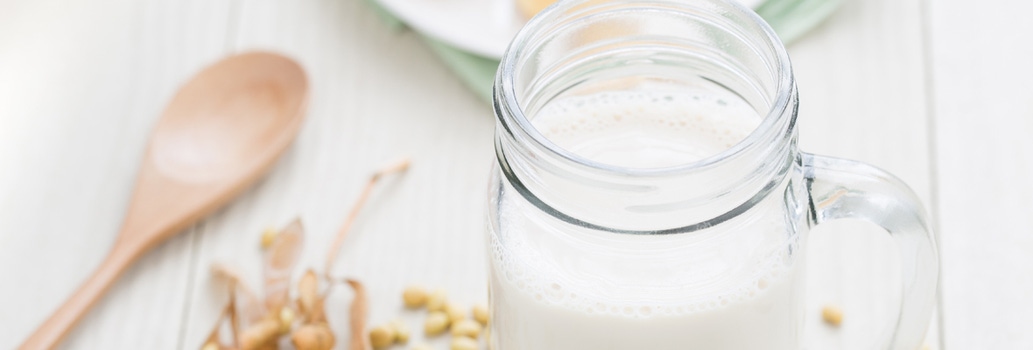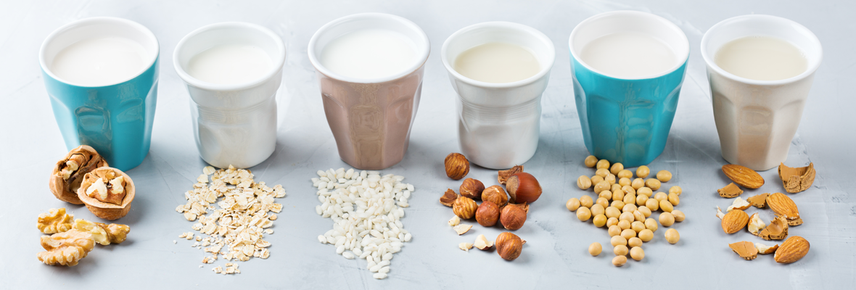
Food in focus: soy milk
What is soy milk?
Soy milk is a plant-based milk made from soybeans and it is far more than a plant milk trend. Soy milk has been widely consumed in Asian countries for more than two thousand years with the earliest evidence traced back to 25–220 AD!
Traditional methods for making soy milk involve grinding the soy beans in water and then boiling the mix before it is strained. Commercial production starts with either whole soy beans or soy protein, water, vegetable oil like sunflower oil, and maltodextrin (broken down vegetable or corn starch). Some varieties are also fortified with vitamins and minerals, most commonly calcium, vitamin B12 and vitamin D.
How does soy milk compare to dairy milk?
Soy milk and dairy milk have very similar nutritional profiles. Soy beans are rich in natural plant proteins, giving soy milk more protein than other milk-alternatives such as oat milk, rice milk or almond milk. In fact, a glass of soy milk generally contains as much protein as a glass of dairy milk.
Soy milks fortified with calcium also have similar levels of calcium as regular cows’ milk.
So, how do soy milk and dairy milk differ? Soy milk is free of lactose, a naturally occurring sugar in dairy milks and other dairy products that can cause an intolerance in some people.
The other real difference comes down to fats. Dairy milk contains saturated fat and cholesterol while soy milk contains polyunsaturated and/or monounsaturated fats from vegetable oils and no cholesterol. A diet low in saturated fats is better for heart health and managing cholesterol levels.
What are the health benefits of drinking soy milk?
Soy milk has a high nutrient content providing valuable protein. In addition some varieties are fortified with nutrients Australian women commonly fall short in, such as calcium, and vitamin D.
It also contains isoflavones, from the soy, contributing to the many protective health benefits of consuming soy foods regularly.
Soy foods, including foods like soy milk, tofu, miso and edamame (young fresh/frozen soybeans), have anti-inflammatory properties and have been shown to lower LDL cholesterol, blood pressure, improve kidney function and also reduce the risk of some cancers.
A growing number of population studies have linked soy food consumption with increased protection from breast cancer in both pre- and post-menopausal women as well as better survival rates. A systematic review, completed in 2019, analysed the correlation between soy product consumption on mortality rates of cancers and found a 12% decrease in breast cancer death with increasing amounts of soy intake.
There’s also increasing evidence that it is good to introduce children, especially girls, to soy foods early. Studies have shown that when girls have 1-1½ servings of soy each day during childhood and adolescence, their risk of breast cancer later in life could be reduced by between 28% - 60%.
Can soy milk help ease symptoms of menopause?
The isoflavones in soy foods, including soy milk have been shown to help reduce hot flushes, one of the most common and frustrating symptoms of menopause. A research study revealed that soy foods or soy supplements could help reduce the frequency of hot flushes, particularly for women experiencing hot flushes frequently
Is soy milk suitable for free-from diets and people with allergies?
- Lactose free - While soy milk contains similar nutrients to dairy milk, it is lactose-free making it an ideal replacement for adults and children who need to follow a lactose-free diet.
- Gluten-free - Most soy milks do not contain gluten, but it is always good to check the pack for a gluten-free label, as well as the ingredient list. Gluten-free products need to undergo rigorous testing to make a gluten-free claim.
- Low FODMAP - Not many soy milks made in Australia have been tested for FODMAPs, however there are some soy milks made from soy protein that are low in FODMAPs. The Monash FODMAP app is available to download, and contains a listing of foods, including soy milks that have been tested and whether they are low FODMAP.
- Nut-free - Nuts are not usually an ingredient in soy milk, but like you would for any food, you should always check the label to ensure there are no traces of nuts listed in or near the ingredient list.
Can children and babies drink soy milk?
While breast milk or infant formula is best for babies under 12 months as their main milk drink, small amounts of regular soy milk can be used in cooking food for children from 7 months of age. From 12 months, children can drink full fat soy milk, whether as a complete replacement for dairy or, if they are not lactose intolerant, having a bit of both in their diet.Soy milk is the only plant milk recommended as a dairy replacement for younger children. This is because it has a similar nutritional profile to dairy milk and contains protein, fat and calcium (if fortified).
Other forms of plant milks are not recommended as a complete replacement for dairy milk for children under 5, because they are lower in protein and fat. However, they can be enjoyed as a nutritious addition to a child’s diet.
Does soy milk contain genetically modified ingredients?
There are no GM soy crops approved to be grown in Australia or New Zealand. For soy milks using imported soy beans or soy protein, check the ingredients list. Foods made with any ingredients containing genetically modified protein must have these ingredients identified as such on the ingredients list.
How do you choose the best soy milk?
There’s now a wide range of choice when it comes to choosing soy milks. So how do you narrow it down? Simply look for a soy milk that is fortified with calcium and vitamin B12. You can rule out any GM ingredients by checking the ingredient list.
The latest nutrition advice, plus health and wellness tips delivered to your inbox monthly

